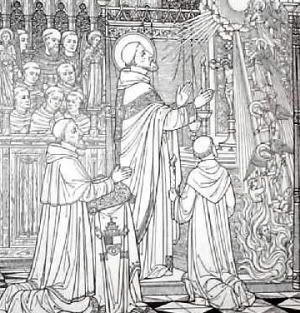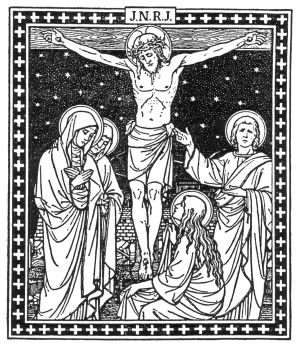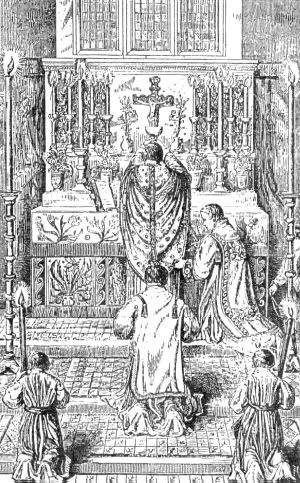One problem with Roman Catholic devotional missals that include a parallel translation of the Latin canon is that a literal rendering of the Latin does not always flow well in English. Even worse is the wholesale paraphrasing in the English vernacular Eucharistic Prayer I of the Missal of Paul VI now in use in Roman Catholic parishes in America.
I offer to provide another version for devotional purposes that seeks to remain faithful to the spirit of the Latin text while putting it in classic Cranmerian English. I am seeking after something that is both genuine and also beautiful and prayerful. Below is my translation of the eucharistic prayer of the Liturgy of St. Gregory (the Roman Rite) in "Prayer Book language." It is a work in progress. I have noted the Latin paragraphs to help you follow the translation. The alternative proper clauses have been left out. Also, I have placed in brackets any explicit additions that seemed appropriate to me. I invite your feedback.
Canon Missae

Te Igitur
[Almighty and] most merciful Father, we humbly beseech thee through Jesus Christ thy Son our Lord, that thou wouldst accept and bless these + gifts, these + offerings, these holy + and unblemished sacrifices, which we offer unto thee for thy holy Catholic Church; vouchsafe to grant unto it thy peace and unity and thy protection and governance throughout the world, together with thy servants N. our Pope, N. our bishop, and with all those who cherish the Catholic and Apostolic faith.
Memento Domine
Remember, O Lord, thy servants and handmaidens [N. and N.], and especially this congregation here present (whose faith and devotion are known unto thee alone) who offer this sacrifice of praise for themselves and for all they hold dear, for the redemption of their souls and for the hope of their safety and salvation, and do now render unto thee, everlasting God, living and true, their most bounden duty and service.
Communicantes
In the fellowship and veneration of the most blessed and glorious ever Virgin Mary, the Mother of our Lord and God Jesus Christ, [and of blessed Joseph her husband,] and also of thy blessed Apostles and Martyrs Peter and Paul, Andrew, James, John, Thomas, James, Philip, Bartholomew, Matthew, Simon and Thaddeus, and of Linus, Cletus, Clement, Xystus, Cornelius, Cyprian, Lawrence, Chrysogonus, John and Paul, Cosmas and Damian, and of all thy saints; grant for the sake of their merits and prayers that we may be defended by thy might and holpen by thy mercy; through Christ our Lord.
Hanc Igitur
We most humbly beseech thee O Lord, that thou wouldst graciously accept this oblation of our service, and that of all thy people; grant unto us peace in our day and deliverance from eternal damnation, that we may be numbered in the flock of thine elect; through Christ our Lord.
Hanc Igitur
And we most humbly beseech thee, O merciful Father, to hear us; and of thy almighty goodness, vouchsafe [by the outpouring of thy Holy Spirit] to + bless, + sanctify, and + approve this offering, making it reasonable and acceptable, that for our good it may verily become the + Body and + Blood of Jesus Christ our Lord;

Qui pridie
Who in the night in which he was betrayed, took bread into his holy and venerable hands; and having lifted up his eyes to heaven, unto thee, God his Almighty Father, and having given thanks unto thee, he + blessed, broke, and gave it to his disciples, saying, "Take and eat, for this is my Body." Likewise after supper, taking into his holy and venerable hands this glorious chalice, again having given thanks unto thee, he + blessed it and gave it to his disciples, saying, "Drink ye all of this; for this is the cup of my Blood of the new and eternal Testament, the Mystery of Faith, which shall be shed for you and for many for the remission of sins. Do this, as oft as ye shall drink it, in remembrance of me."
Unde et memores
Wherefore, O Lord and heavenly Father, we thy humbly servants, having in remembrance the blessed passion and precious death of thy Son Christ our Lord as well as his mighty resurrection and glorious ascension, now offer unto thy divine Majesty from these thy holy gifts, a + Victim which is pure, a + Victim which is holy, a + Victim which is spotless—the holy Bread of life eternal and the Cup of everlasting salvation.
Supra quae
Vouchsafe to look upon them with a merciful and gracious countenance, and accept them as thou didst accept the gifts of thy righteous servant Abel, the sacrifice of our patriarch Abraham, and that which thy high priest Melchizedek offered unto thee, a holy sacrifice, an immaculate victim.
Supplices te
We most humbly beseech thee, Almighty God, to command that these our prayers and supplications, by the ministry of thy holy angels, may be carried unto thine altar on high before the sight of thy divine Majesty, that we who shall be partakers of these holy Mysteries may worthily receive the most precious + Body and + Blood of thy Son and be filled with thy grace and heavenly benediction; through the same Christ our Lord.
Memento etiam
Remember, O Lord, thy servants and handmaidens [N. and N.], who have gone before us with the sign of faith, and now rest in the sleep of peace; we beseech thee to grant unto them, and to all who rest in Christ, a place of refreshment, light, and peace; through the same Christ our Lord.
Nobis quoque peccatoribus
Although we are unworthy servants, through our manifold sins, we humbly beseech thee mercifully to grant us grace to share in the fellowship of thy holy Apostles and Martyrs: of John, Stephen, Matthias, Barnabas, Ignatius, Alexander, Marcellinus, Peter, Felicitas, Perpetua, Agatha, Lucy, Agnes, Cecilia, Anastasia, and of all thy saints. Into their blessed company, we beseech thee to admit us, not weighing our merits, but pardoning our offences, through Jesus Christ our Lord, the fount of all + holiness, + life, and + blessing upon every gift of creation.
By + whom, and with + whom, and in + whom, in the unity of the Holy Ghost, all honor and glory be unto thee, O Father Almighty, world without end. Amen.



4 comments:
Powerful. That is the prayer contained in the Holy Roman Church's "Book of Divine Worship": their version of the 1979 BCP.
Very close. I believe the version in the BDW may be the Coverdale translation (for Rite One), which does not always roll off the tongue very smoothly. This is a new rendering, trying to make things smoother and utilize, when possible, Cranmer's phraseology in the Anglican liturgy.
The Coverdale version is not perfect, but more fathfull to the letter (and spirit) of the Latin original.
If you wish to do a good translation, translate strictly literally, lest it is not worth of.
"Papa", "antistitis", "cultor" etc - so many words replaced. Why? Those are even the words which testify of the ancientness of the Roman canon.
Thanks for showing us how many abortions have happened since opening the page, I was almost hopeless that our world would just keep getting overpopulated.
Post a Comment